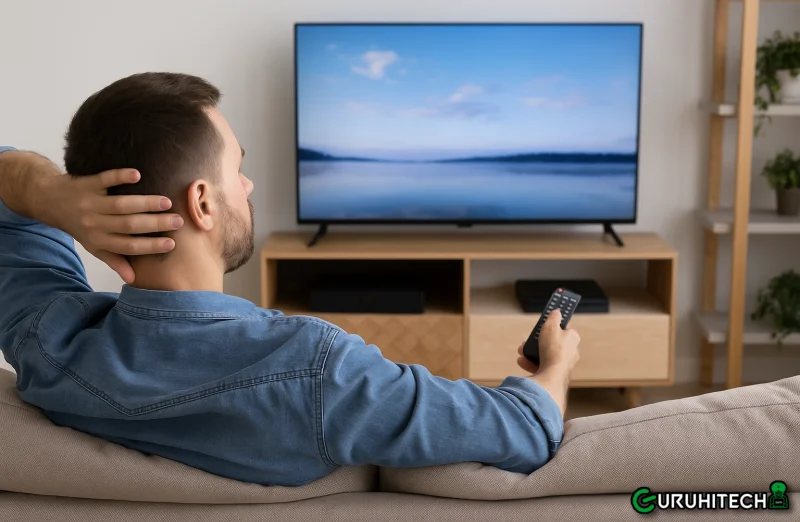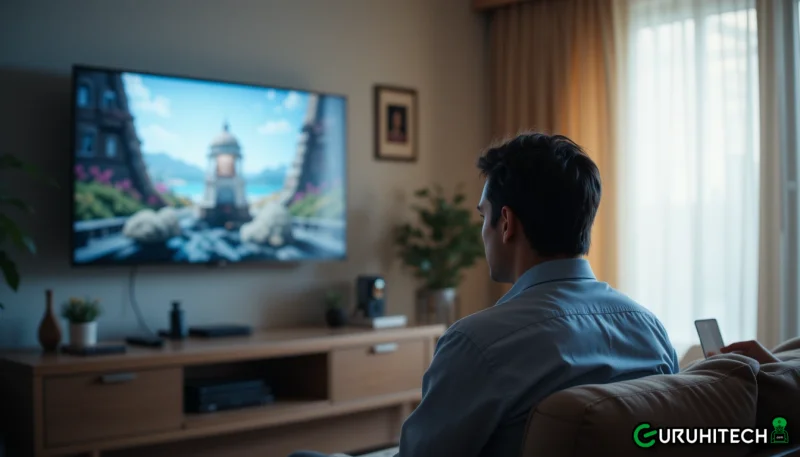How Long Should a TV Last?

When you are spending some serious cash on a new TV, one of the first questions you may ask yourself is, “How long should a TV last? After all, TVs aren’t inexpensive, and it’s something that you want to get the maximum amount of use out of. Whether you invested in an OLED or LED TV, it doesn’t serve you if it has a short life span, so how long are they meant to last?
From how frequently you use it to the brand and model of the machine, a number of factors play a role in how long your ice maker will last. With so much technology packed into a single thin screen, how long should you expect to keep your TV? In this article, we’ll explain the average lifespan of various TV types, what influences how long a TV lasts, and ways to keep your set running as long as possible to ensure you get the most entertainment from your investment for years to come.
The Lifespan of Different TV Types
TV technology has undergone significant changes over the last 35 years or so, resulting in various types of TVs with differing lifespans. Each type — LED, OLED, and QLED — offers its pros and cons when it comes to longevity. Let’s compare the approximate lifespan for each type of television:
LED TVs
LED TVs are the most widely used TVs due to their superb picture quality and energy efficiency. With normal usage, an LED TV can last between 6 and 10 years. The life span can depend on factors like how much it’s used, as well as the environs it’s kept in, and how well it’s maintained. The backlighting on an LED TV can fade with prolonged use, but the display itself generally remains stable. In reality, with a minimum of simple care and not overexposing it to extreme heat or cranked-up brightness settings, you can easily use it for the long term.
OLED TVs
(Organic Light Emitting Diodes) TVs have long been prized for their picture quality, which includes perfect blacks, vibrant colors, and faster response times. However, they are more expensive and require more careful handling than an LED model. Normal use and your OLED TV will last between 5 and 7 years, and under optimal conditions, it can last up to 10 years.
A well-known problem with OLED displays, however, is burn-in – you can see static images on a screen if it’s left on for too long. If you frequently keep channels like news or stock tracker channels on with static content, you will notice this more. If you tinker with the brightness setting and you steer clear of static images for long periods, your OLED TV can nudge up closer to that 7-year mark.
QLED TVs
QLED TVs, created by Samsung, build on the special experiences LED and OLED offer. Quantum Dots have even been implemented here for rich colors and enhanced brightness. QLED TVs last as long as LED TVs so you can expect 8 to 10 years of use. This type of TV is less susceptible to problems like burn-in, making it a more durable option for the long term. With proper care and use, most QLED TVs will last for 10 years or more, still delivering stunning picture quality.
Factors That Affect TV Lifespan
The type of TV you have isn’t the only factor that affects how long it will last, however — there are a number of others to consider as well. Here are the things you should keep in mind to ensure you get the most life out of your TV.
Usage Patterns
The most critical factor affecting your TV’s longevity is probably how often you use it and the manner in which you do. TVs that are used frequently will simply wear down quicker than those that aren’t used very often. The more hours you log in front of your TV, the more likely your TV will show signs of age, such as worsening picture quality or pixel burn. However, if you are smart about how you use your TV and refrain from leaving it on all the time, you can make it last longer.
Environmental Factors
The space where your TV lives also plays a significant role in determining how long it is likely to last. Your television is more likely to be damaged if the room is poorly ventilated, too humid, or too hot. Dust accumulation on the screen and in the vents can even impact your TV’s performance. Try to place your TV in a cool, dry location, and clean it regularly to prevent dust buildup.
Brand and Build Quality
Television brands are not created equal. Some manufacturers are better than others at building TVs that last, and some are better than others at building TVs that last for less. Brands that prioritize high-quality mechanical components and release regular firmware updates will have a longer lifespan. Spend the extra dollars to buy a well-established and well-regarded brand to get the maximum life out of your TV.
Maintenance and Care
Properly caring for your TV can significantly extend its lifespan. This includes cleaning the screen and vents periodically, setting the TV to the correct brightness, and storing it in a safe location that protects it from potential damage. Additionally, an energy-efficient smart TV remote can help save wear and tear by not operating at high brightness levels all the time.
Power Surges and Electrical Issues
And after all, power surges can fry your TV’s insides and shorten its life. Plugging into a surge protector is never a bad idea when it comes to keeping sudden power spikes from cooking your TV. Electrical problems, such as power surges and unstable voltage, can also damage your TV, reducing its lifespan. This can help ensure that your TV lasts as long as possible by preventing electrical damage.

Leggi anche:
How to Prolong Your TV’s Life
The effects of time are unavoidable, but there are things you can do to prolong the life of your TV. Some simple and easy tips to keep your TV running its best:
1. Keep the TV at Optimal Brightness Levels
Many TVs have factory-set brightness settings that are too high for typical viewing conditions. Running your TV at full brightness all the time will prevent the TV’s components from being overworked and worn out much sooner. Turn down the brightness so it’s not blinding, particularly if you’ve got the TV stationed in a lit room.
2. Avoid Direct Sunlight Exposure
Although it is fun to watch TV outside the house, it may cause your TV screen to decline and wear out prematurely. The sun’s UV rays can cause the display to fail, resulting in diminished image quality over time. To avoid this, try placing your TV away from direct sunlight or closing a few curtains to block the sunlight from hitting the screen.
3. Regular Cleaning and Maintenance
The TV screen and internal components may contain dust, which can affect performance. Use a soft microfiber cloth to clean your TV, ensuring the vents are free of dust. This will help the TV stay cool and prevent overheating.
4. Update Software Regularly
Smart TVs are frequently updated to enhance their performance and add new features. Keeping your TV’s software updated is important for numerous reasons: Watching TV: The dashboard of your console is frequently updated, but updating ensures the best performance, and helps prevent bugs or glitches from ruining your system.
5. Use a Surge Protector
Power surges aren’t going to help your TV last long, so we’d recommend a surge protector. This can help prevent sudden surges of electricity from damaging the internal components of your TV, thereby extending its lifespan.
Signs Your TV Needs Repair
And no matter how well you take care of it, there will likely be a time when the TV begins to show signs of wear and tear. Knowing when to get your TV repaired or replaced can save you money and help you reap the most benefit from your TV investment.
1. Picture Quality Degradation
If the picture quality of your TV begins to deteriorate, with colors appearing distorted or the image looking pixelated, this could be a result of internal hardware failure. This is probably due to faulty hardware, such as bad wiring, damage to the screen, or outdated hardware that is no longer functioning properly.
2. Unusual Sounds
A television that makes odd sounds, such as buzzing or crackling, may indicate that there is a problem with the internal circuitry or with the audio. Not all of the problems mentioned are fixable, but working through them can help you find relief for a damaged tank, or at the very least can point you in the direction of a suitable solution.
3. Frequent Shutdowns or Freezing
If your TV still turns off by itself or runs slowly, it could be due to a faulty power supply or software issues. Often this can be resolved with a quick software update or power down, but occasionally you’ll have to enlist professional repair help.
4. Dead Pixels
Dead pixels are one of the more common problems on OLED and LCD TVs (although we do also hear of plasma displays having this issue), where a small handful of pixels on a screen “get stuck” on a colour and don’t change when they should. Although a handful of dead pixels might not be a significant issue, having large portions of the screen affected by them could be indicative of a larger problem.
When to Seek Professional Help
If your TV is malfunctioning and you’re unable to troubleshoot the issue, it’s likely time to turn to the professionals. TV Repair Services can diagnose and fix your TV from screen problems to sound malfunctions. If you are staying in Pomona, CA, and as soon as you need any specialized care, then the best bet for you is to consider reaching out to Electronics Repair services in Pomona, CA, for all kinds of TV repairs.
In conclusion, the lifespan of your TV is determined by the type of TV you have, your usage, your environment is and how well you take care of it. Some TVs are designed to last up to 10 years, and to meet this mark, you want to spend your money sensibly while looking for a good deal. With proper precautions and regular maintenance, your TV is going to live a long and happy life, and along with that, you can enjoy superior entertainment.
Ti potrebbe interessare:
Segui guruhitech su:
- Google News: bit.ly/gurugooglenews
- Telegram: t.me/guruhitech
- X (Twitter): x.com/guruhitech1
- Bluesky: bsky.app/profile/guruhitech.bsky.social
- GETTR: gettr.com/user/guruhitech
- Rumble: rumble.com/user/guruhitech
- VKontakte: vk.com/guruhitech
- MeWe: mewe.com/i/guruhitech
- Skype: live:.cid.d4cf3836b772da8a
- WhatsApp: bit.ly/whatsappguruhitech
Esprimi il tuo parere!
Che ne pensi di questa notizia? Lascia un commento nell’apposita sezione che trovi più in basso e se ti va, iscriviti alla newsletter.
Per qualsiasi domanda, informazione o assistenza nel mondo della tecnologia, puoi inviare una email all’indirizzo [email protected].
Scopri di più da GuruHiTech
Abbonati per ricevere gli ultimi articoli inviati alla tua e-mail.
